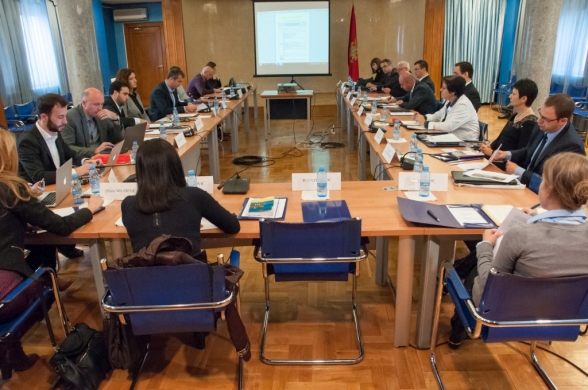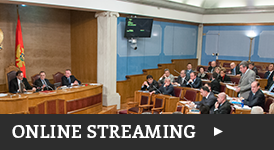The roundtable titled “Do we need a Law on Parliament” was held in the Parliament of Montenegro, in the organisation of NGO “Institute Alternative” and with the support of Montenegrin Parliament.
Representatives of MP Groups: DPS, DF, SNP, SDP, PCG, BS and Albanian parties HGI and LPCG, within the first panel, shared views on the topic: “Law on Parliament as a legal basis for functioning of Montenegrin Parliament”. The participants have noted that most of countries do not have a separate law on parliament but instead of it they have the Law on MPs. Law on Parliament wouldn’t be enough if not followed by amendments to the Rules of Procedure. Participants debated on necessity of financial independence of the Parliament as well as on rights and responsibilities of MPs and parliamentary staff. The Parliament may be additionally improved by strengthening its control role, and holding greater number of control hearings and sittings devoted to Prime Minister’s Hour. Representatives of MP Groups mainly pointed out to necessity of resolving the problem of insufficient space in the Parliament of Montenegro, stressing that working conditions were much better now than several years ago, but they should be additionally improved.
Secretary General of the Parliament of Montenegro Mr Damir Davidović, Vice President of the National Assembly of the Republic of Serbia Ms Gordana Čomić, Assistant Secretary General of the National Assembly of the Republic of Srpska and Head of the Legislative Sector Ms Mirjana Radaković as well as expert associate in the Assembly of the Republic of Macedonia Mr Nikola Atanasovski spoke on the topic “Organising the work of parliament – regional experiences”
The Roundtable stressed that Montenegrin Parliament was transparent and publically available in the greatest possible extent and that a number of activities aimed at training of employees had been carried out. The importance of planning has been underlined, which means introducing action plans in order to make the Service more professional and hence more efficient. In their remarks, participants noted that instead of adopting new it would be enough to respect and apply the current laws. Experiences of others are welcome but they cannot be always applicable, since various countries do not share epochs, standards, time and course of institutional memories.
In addition to organiser of the gathering “Institute Alternative”, the following took part in today's discussion: Center for Development of Non-Governmental Organisations, Coalition of NGOs "Through Cooperation to Goals" , Center for Democratic Transition, Center for Monitoring and Research and Centre for Civic Education.
Representatives of NGO sector emphasised traditionally good cooperation with the Parliament of Montenegro and the Secretary General who, as they noted, showed once more good will and agreed to organise the roundtable in Montenegrin Parliament.











